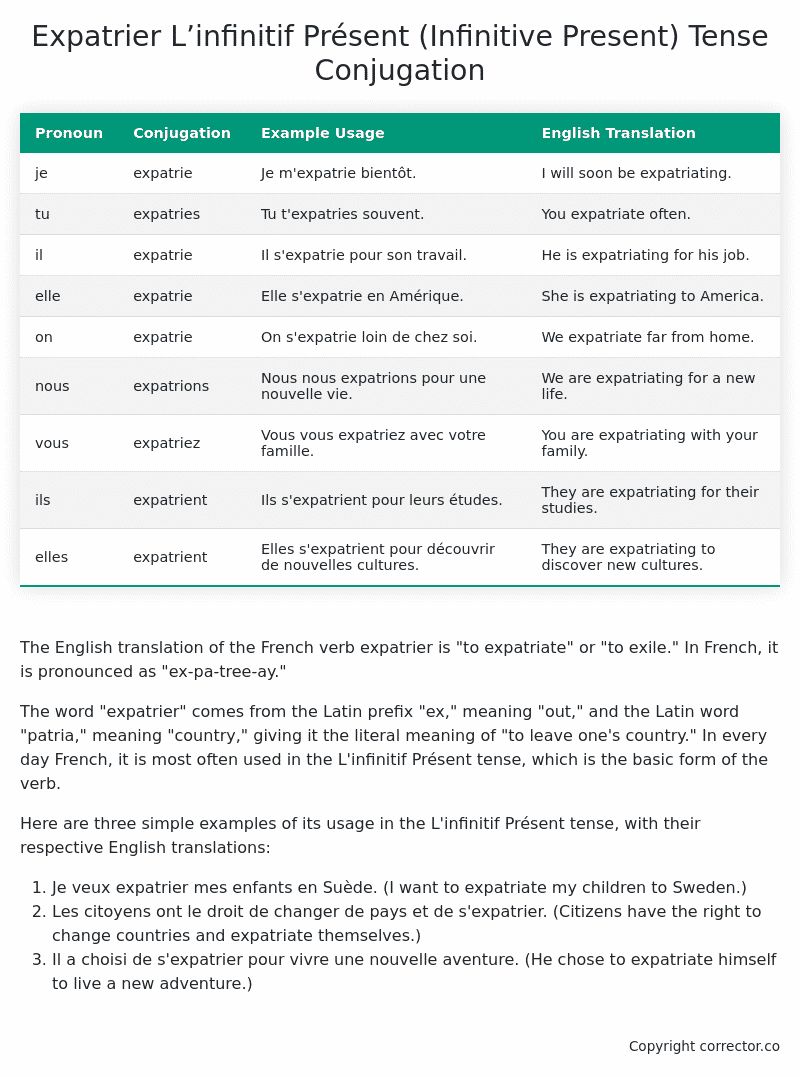L’infinitif Présent (Infinitive Present) Tense Conjugation of the French Verb expatrier
Introduction to the verb expatrier
The English translation of the French verb expatrier is “to expatriate” or “to exile.” In French, it is pronounced as “ex-pa-tree-ay.”
The word “expatrier” comes from the Latin prefix “ex,” meaning “out,” and the Latin word “patria,” meaning “country,” giving it the literal meaning of “to leave one’s country.” In every day French, it is most often used in the L’infinitif Présent tense, which is the basic form of the verb.
Here are three simple examples of its usage in the L’infinitif Présent tense, with their respective English translations:
- Je veux expatrier mes enfants en Suède. (I want to expatriate my children to Sweden.)
- Les citoyens ont le droit de changer de pays et de s’expatrier. (Citizens have the right to change countries and expatriate themselves.)
- Il a choisi de s’expatrier pour vivre une nouvelle aventure. (He chose to expatriate himself to live a new adventure.)
Table of the L’infinitif Présent (Infinitive Present) Tense Conjugation of expatrier
| Pronoun | Conjugation | Example Usage | English Translation |
|---|---|---|---|
| je | expatrie | Je m’expatrie bientôt. | I will soon be expatriating. |
| tu | expatries | Tu t’expatries souvent. | You expatriate often. |
| il | expatrie | Il s’expatrie pour son travail. | He is expatriating for his job. |
| elle | expatrie | Elle s’expatrie en Amérique. | She is expatriating to America. |
| on | expatrie | On s’expatrie loin de chez soi. | We expatriate far from home. |
| nous | expatrions | Nous nous expatrions pour une nouvelle vie. | We are expatriating for a new life. |
| vous | expatriez | Vous vous expatriez avec votre famille. | You are expatriating with your family. |
| ils | expatrient | Ils s’expatrient pour leurs études. | They are expatriating for their studies. |
| elles | expatrient | Elles s’expatrient pour découvrir de nouvelles cultures. | They are expatriating to discover new cultures. |
Other Conjugations for Expatrier.
Le Present (Present Tense) Conjugation of the French Verb expatrier
Imparfait (Imperfect) Tense Conjugation of the French Verb expatrier
Passé Simple (Simple Past) Tense Conjugation of the French Verb expatrier
Passé Composé (Present Perfect) Tense Conjugation of the French Verb expatrier
Futur Simple (Simple Future) Tense Conjugation of the French Verb expatrier
Futur Proche (Near Future) Tense Conjugation of the French Verb expatrier
Plus-que-parfait (Pluperfect) Tense Conjugation of the French Verb expatrier
Passé Antérieur (Past Anterior) Tense Conjugation of the French Verb expatrier
Futur Antérieur (Future Anterior) Tense Conjugation of the French Verb expatrier
Subjonctif Présent (Subjunctive Present) Tense Conjugation of the French Verb expatrier
Subjonctif Passé (Subjunctive Past) Tense Conjugation of the French Verb expatrier
Subjonctif Imparfait (Subjunctive Imperfect) Tense Conjugation of the French Verb expatrier
Subjonctif Plus-que-parfait (Subjunctive Pluperfect) Tense Conjugation of the French Verb expatrier
Conditionnel Présent (Conditional Present) Tense Conjugation of the French Verb expatrier
Conditionnel Passé (Conditional Past) Tense Conjugation of the French Verb expatrier
L’impératif Présent (Imperative Present) Tense Conjugation of the French Verb expatrier
L’infinitif Présent (Infinitive Present) Tense Conjugation of the French Verb expatrier (this article)
Struggling with French verbs or the language in general? Why not use our free French Grammar Checker – no registration required!
Get a FREE Download Study Sheet of this Conjugation 🔥
Simply right click the image below, click “save image” and get your free reference for the expatrier L’infinitif Présent tense conjugation!

Expatrier – About the French L’infinitif Présent (Infinitive Present) Tense
Forming the Infinitive Present
Common Everyday Usage Patterns
As a Verb’s Dictionary Form
After Modal Verbs
As an Imperative
In Infinitive Clauses
Interactions with Other Tenses
Present Tense
Future Tense
Conditional Tense
Passé Composé
Imperfect Tense
Subjunctive and Conditional Moods
Summary
Want More?
I hope you enjoyed this article on the verb expatrier. Still in a learning mood? Check out another TOTALLY random French verb conjugation!


